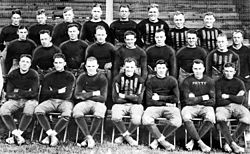1920 Decatur Staleys season
| 1920 Decatur Staleys season | |
|---|---|
 |
|
| Head coach | George Halas |
| Home field | Staley Field |
| Results | |
| Record | 10–1–2 |
| League place | 2nd APFA |
The 1920 Decatur Staleys season was their inaugural regular season completed in the newly formed American Professional Football Association. The club posted a 10–1–2 record under first year head coach/player George Halas earning them a second-place finish in the team standings. The stars of the Staleys were Ed "Dutch" Sternaman, Jimmy Conzelman, and George Halas. Sternaman has a remarkable season with 11 rushing TDs, 1 receiving TDs, 4 field goals, and 3 PATs, totaling 87 points scored out of the Staleys' total of 164. Jimmy Conzelman ran for two scores and threw two more. Halas led the team in receiving scores with 2. In the last league game of the season, the Staleys needed a win versus Akron to have a chance at the title. Akron, predictably, played for a tie, achieved that, and won the first APFA title.
The Decatur Staleys finished 6–1 in their 1919 season as an independent team. Their 1919 owner, George Chamberlain, asked George Halas to help own the team, and Halas accepted. After the 1919 season, representatives of four Ohio League teams—the Canton Bulldogs, the Cleveland Tigers, the Dayton Triangles, and the Akron Pros—called a meeting on August 20, 1920, to discuss the formation of a new league. At the meeting, they tentatively agreed on a salary cap and pledged not to sign college players or players already under contract with other teams. They also agreed on a name for the circuit: the American Professional Football Conference. They then invited other professional teams to a second meeting on September 17.
At that meeting, held at Bulldogs owner Ralph Hay's Hupmobile showroom in Canton, representatives of the Rock Island Independents, the Muncie Flyers, the Decatur Staleys, the Racine Cardinals, the Massillon Tigers, the Chicago Cardinals, and the Hammond Pros agreed to join the league. Representatives of the Buffalo All-Americans and Rochester Jeffersons could not attend the meeting, but sent letters to Hay asking to be included in the league. Team representatives changed the league's name slightly to the American Professional Football Association and elected officers, installing Jim Thorpe as president. Under the new league structure, teams created their schedules dynamically as the season progressed, so there were no minimum or maximum number of games needed to be played. Also, representatives of each team voted to determine the winner of the APFA trophy.
...
Wikipedia
